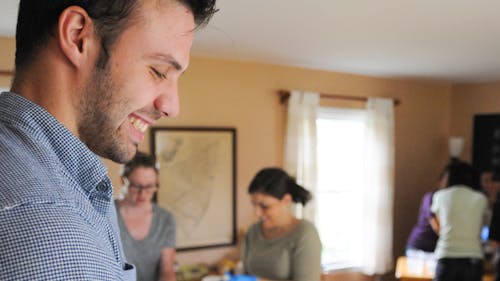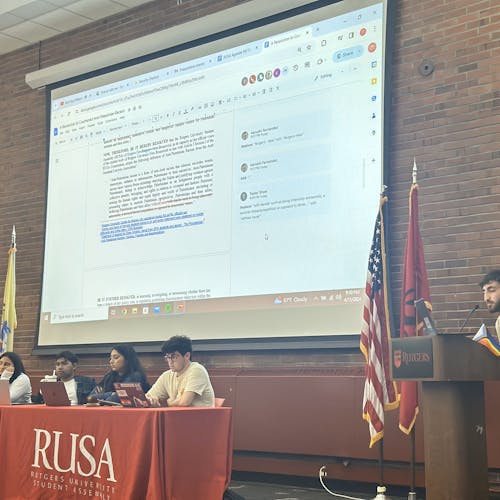Group brings organic food and friends to Rutgers

Goats bleated, chickens trotted across the dusty dirt and cows blinked slowly in the sun as Tina Lubomira Burnat made her own ricotta and mozzarella cheeses by hand over the past weekend.
Burnat, the president of Slow Food Rutgers, visited Cherry Grove Farm in Lawrenceville, New Jersey, with a handful of other Slow Food Rutgers members to take a community cheese-making class in the afternoon. Afterwards, the group took a tour of the barn animals and the operations of the organic ecosystem.
Slow Food Rutgers is an organization that promotes the pleasure of making and eating good food. The organization also advocates the duty to protect the heritage of biodiversity, culture and knowledge that makes good food a treat.
The International Slow Food Movement, born in 1989, is the brainchild of Carlo Petrini. He noticed people were growing hazier about where their food was coming from, how it was being produced and sometimes even what comprised its basic ingredients.
People headed for the fast food chains in his native Italy, and the traditional Carciofi alla romana dish sat untouched. He became “disheartened” by the dwindling interest in local food traditions, and so he created the Slow Food International organization that would eventually expand to all 50 American states.
Burnat, a School of Environmental and Biological Sciences senior, said food is at the epicenter of practically every sphere of life.
“Every time you make a decision about what you’re going to eat, what you’re going to purchase and whom you’re purchasing it from, you make a difference,” she said. “You make a vote.”
The organization involves many trips and events. They have two activities planned for the semester and 200 active members poised to sign up.
The executive board of Slow Food Rutgers is responsible for the scheduling of events, but the trips are arranged with input from all members.
Amelia Del Monte, an executive board member and School of Arts and Sciences senior, attended the cheese-making day at Cherry Grove Farm, but she has also been a part of movie nights and potluck dinners at the George Street Co-op, natural foods market and cafe.
The George Street Co-op, a local business located at 89 Morris St., is an active partner with Slow Food Rutgers and works to make locally sourced organic food an available commodity for everyone, including college students on a presumably slim budget, she said.
The George Street Co-op operates on a “sweat equity” system, a sliding scale that gives benefits proportional to how much an individual contributes to the business. Students and people that are below a certain income level are eligible to participate in the program.
Working two hours a month reaps a 5 percent discount with each purchase, and working six hours a week garners a 25 percent discount every time.
The store also accepts Supplemental Nutrition Assistance Program and Women, Infants and Children benefits. Accepting SNAP and WIC benefits debunks the idea that organic food has a class line, at least at the Co-op.
People commonly believe that only upper middle-class or upper-class people eat kale, make power smoothies and buy spirulina for $20 a pound, Burnat said. Yet she thinks organic food can be an option available to everyone.
Burnat works six hours a week, meaning she brings home bags full of organic produce and dry goods with a receipt no more expensive than a bill from a ShopRite grocery store.
Del Monte, also a regular shopper at the Co-op, said students can regularly make their own healthy breakfasts, lunches and dinners just by investing in two or three staple items in conjunction with other foods and eating seasonal produce.
Red quinoa, kale and oats are some of her favorites, she said. She also likes frozen berries because they are cheaper and last longer on the shelf compared to fresh produce.
When Slow Food Rutgers is not buying and cooking their own food, the organization has ventured on trips to farm-to-table restaurants.
Kendra Avinger, vice president of Slow Food Rutgers, traveled to Agricola, a farm-to-table restaurant in Princeton, New Jersey. It was her first time in her life going to a farm-to-table eatery, and it was her first trip as a part of Slow Food Rutgers.
Everyone who came on the trip had a three-course meal and then met the chef.
Avinger, a School of Environmental and Biological Sciences senior, is the daughter of a single Puerto Rican mother who shopped for groceries primarily based on their convenience. Until Avinger joined Slow Food Rutgers and then ate at Agricola, she “didn’t really know” about food variety.
On the way home in the car, she felt close to the other members, although she had genuinely gotten to know them all only a few hours prior.
“I felt a sense of community just because of food,” she said.
On Oct. 11, Slow Food Rutgers will host another communal meal, the autumnal farm-to-table dinner at Stony Brook Meadows in Hopewell, New Jersey. This time, the event doubles as a dinner and a cooking class.
On Sept. 27, approximately 10 members from Slow Food Rutgers will travel to Stony Brook Meadows to harvest and cook some of the food for the dinner in October.
On Oct. 11, all the dinner guests will be presented with a full course organic meal entirely harvested and cooked by the people sitting around the table.
The theme of Slow Food Rutgers is conviviality, Burnat said, and all the members make it known.
The organization loves to cook, she said, just as they love to laugh. They bake cookies for one another around finals season to get through it and spend their weekends with each other to make cheese.
“Food brings togetherness and family,” Avinger said.



